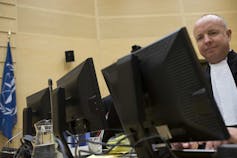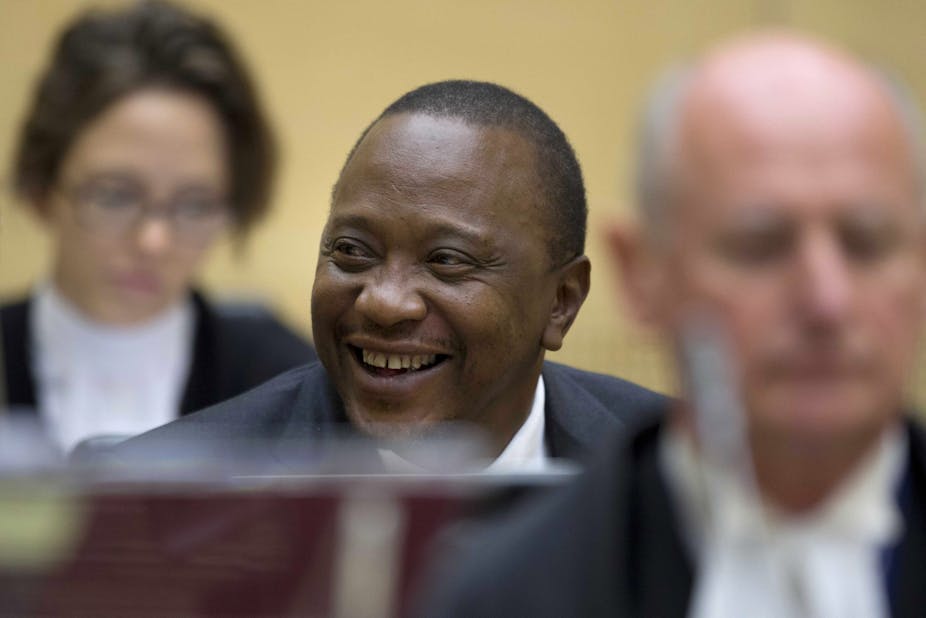The first appearance of a head of state at the International Criminal Court at The Hague yesterday was a landmark event.
But instead of getting any closer to the truth about who was behind violence that claimed more than 1,000 lives in Kenya in 2007, the court has also found itself on trial.
The case has highlighted many of the weaknesses of the world’s only international legal avenue for pursuing people responsible for genocide, war crimes and other crimes against humanity. Indeed, whatever decision the court reaches will have far-reaching consequences for attempts to achieve international justice in the future.
No evidence – or evidence withheld?
Kenyan President Uhuru Kenyatta arrived to a crowd of dancing, cheering supporters outside the court in the Netherlands.
Kenyatta faces charges of crimes against humanity over allegations that he helped instigate violence that followed Kenya’s December 2007 presidential election. More than 1,000 people were killed and more than 600,000 people displaced.
He is alleged to have been “criminally responsible as an indirect co-perpetrator” in cases of murder, deportation or forcible transfer, rape, persecution and other inhumane acts.
While Kenyatta was appearing and was charged as an individual, the case has made headlines around the world as he is the first sitting head of state to appear at the ICC since it was established 12 years ago to prosecute war crimes.
Kenyatta’s guilt or innocence will not be determined this week. Instead, Kenyatta has been called to the ICC to explain allegations that the Kenyan government had withheld evidence against him - in particular, phone records that the prosecution argues prove links between Kenyatta and the Mungiki sect, which took part in the deadly 2007 violence.
As a signatory to the Rome Statute, Kenya is obliged to “cooperate fully with the Court in its investigation and prosecution of crimes within the jurisdiction of the Court”.
There have also been claims of witnesses being bribed and intimidated. Kenyan human rights lawyers have described “how potential witnesses have been cajoled and bullied into withholding their testimony”.
The day before the president’s appearance, Kenyan Attorney-General Githu Muigai argued at the ICC that the lack of evidence against Kenyatta was reflective of the weakness of the prosecution’s case rather than proof that evidence had been withheld.
Why the ICC is so controversial – especially in Africa
The Kenyatta case is controversial. It represents the first time that the court’s Office of the Prosecutor (OTP) has initiated an investigation. Until now, all the other cases being investigated have been either self-referrals or, in the case of Libya and Sudan, referred through United Nations Security Council resolutions.
There are also questions as to whether the Kenyan situation lies within the ICC’s remit. Traditionally, domestic judiciaries deal with such cases. Importantly, the ICC is a court of last resort; prosecutions proceed only once the OTP is convinced that the state in question has neither the capacity nor willingness to initiate legal proceedings.
However, in the seven years since the ethnically motivated post-election violence occurred, Kenyan authorities have shown little desire to prosecute those responsible, despite assurances that a special tribunal would be established to try the perpetrators.
According to Human Rights Watch, not only have the authorities failed to provide justice for the victims of the violence, there has been impunity for police officials implicated in crimes.
A further controversy concerns Kenyatta’s status as president and whether that should excuse him from prosecution. Three things to keep in mind: first, when indicted, Kenyatta was serving as finance minister and deputy prime minister in a grand coalition government.
Second, he has been charged as an individual, not as a government official.
Finally, one of the primary rationales for the establishment of the ICC was to render the idea of sovereign impunity redundant.
Complicating this further, Kenyatta has taken advantage of a provision in the Kenyan constitution that allows him to resign the presidency for the duration of his time at the ICC. (He temporarily handed over power to Deputy President William Ruto, who is also facing charges at the ICC as an “indirect co-perpetrator” involved with murder, deportation or forcible transfer of population, and persecution.)
So, technically, for the period that Kenyatta appeared at the International Criminal Court, he wasn’t a head of state.
Kenyatta did this arguing that he did not want to compromise the sovereignty of Kenyans.
This seems rather disingenuous; his words and actions leading up to this week’s proceedings suggest that he is primarily motivated by self-interest.
Hunting Africans?
Ethiopian Prime Minister Hailemariam Desalegn and others have accused the ICC of “hunting Africans”, at the expense of harder, more politically sensitive cases.
A cursory glance at the 21 cases in nine situations that have been brought before the ICC suggest there might be some truth in this: all of the situations under investigation are in African countries.
However, as I’ve argued before, in and of itself, this is not a problem.
The greater problem is those situations not under investigation, such as Sri Lanka, Syria and Israel/Palestine, for example.
What happens next?
After this week’s hearings, the case has been adjourned for now. There are now two most likely outcomes.
The first is that the Trial Chamber will make a finding of non-cooperation against Kenya as a state party and refer the matter to the Assembly of States Parties for appropriate action (as stipulated under Article 122 of the Rome Statute).
In practice, this would mean further delays and, considering the court’s lack of an enforcement mechanism, might make very little difference to Kenya’s obstinacy.
The second outcome – which has been aggressively pursued by Kenyatta’s defence team – is for the Trial Chamber to declare that there is insufficient evidence for the trial to continue.
If the Trial Chamber does decide to drop the case, it would be a massive blow to international justice. It would most likely close the last avenue of legal justice to the victims of the post-election violence in Kenya.
And it would also serve to undermine one of the key reasons the ICC was established: to challenge sovereign impunity.
What this case shows about the ICC
This case has demonstrated both the strengths and the weaknesses of the ICC.
For all its limitations, the ICC still provides an avenue for justice where otherwise none would exist. Those arguing that Kenyatta should respond to charges at the ICC note that the Kenyan justice system lacks transparency and fairness:
These are our leaders, and I think they have a lot of money, and I know they can do everything. But when they go to the ICC, I think there will be justice there, because there is no corruption there. In most of our courts here, I think there is corruption.

Indeed, Fergal Gaynor, the victim’s representative at this week’s proceedings, argued that “victims should not pay the price of obstruction to justice by the Kenyan government”.
But this case has also demonstrated the degree to which the ICC remains dependant, even beholden, to the cooperation of states like Kenya.
The Kenyan government’s ongoing refusal to acknowledge the ICC’s authority is part of a broader, regressive trend that erodes the progress made against sovereign impunity in Africa.
At an African Union summit in July this year, African leaders agreed to set up an African court of justice and human rights, which would grant sitting leaders and senior officials immunity from prosecution on charges of war crimes, crimes against humanity and genocide.
While we await the Trial Chamber’s decision, we seem as far away from a truly global legal mechanism for justice as we have ever been.

